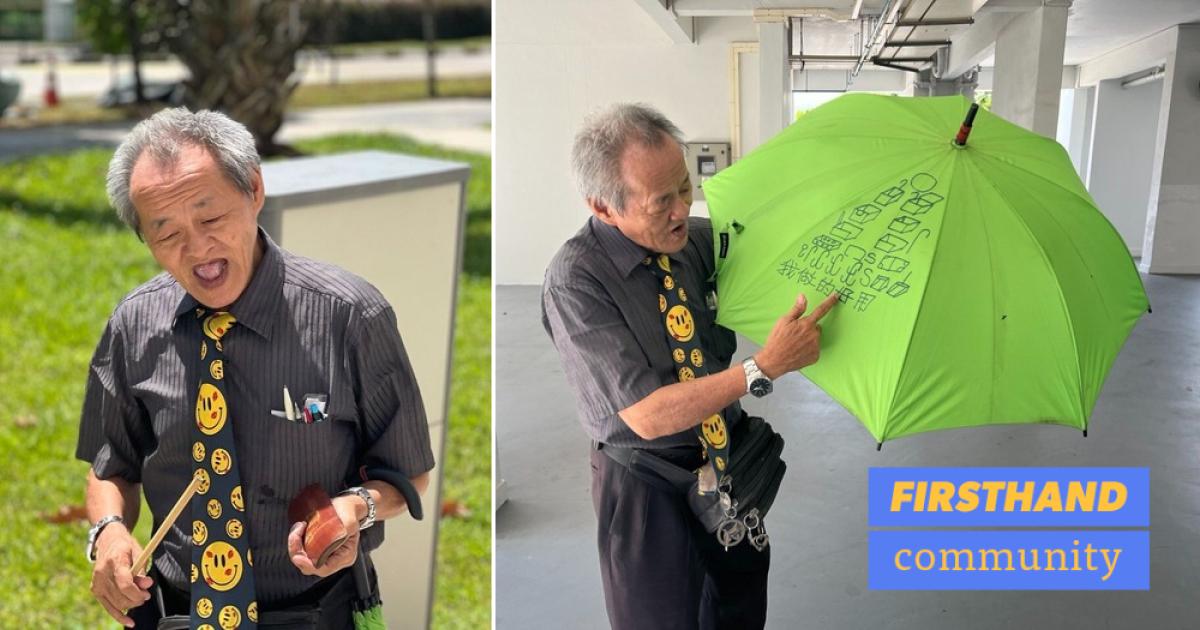Firsthand: Community is a new series by Mothership, where we explore the spirit of community in Singapore through in-depth articles and videos.
From Tampines to Tuas, we’ll investigate the untold stories of the different neighbourhoods in Singapore — firsthand.

The first thing that struck me about Lai Kok Chuen, 70, was his swashbuckling attire.
He donned a tie that had yellow smiley faces and cartoon lipstick stains plastered all over it.
He also wore two wristwatches, one on each hand. When I asked why, he responded matter-of-factly, like it was the most obvious thing in the world:
"People gave me the watches. So, I wear them."
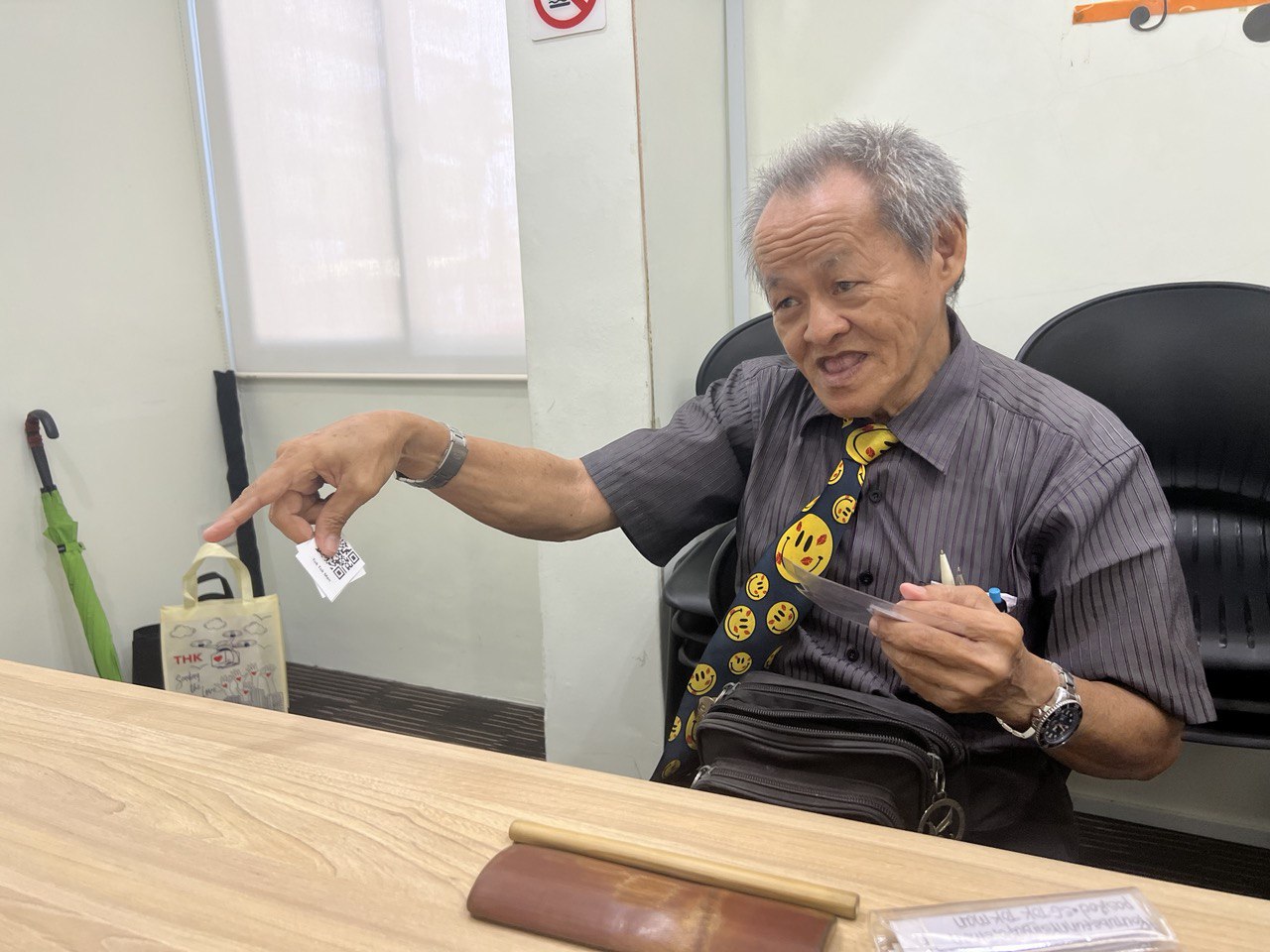 Photo by Ilyda Chua.
Photo by Ilyda Chua.
Lai clearly came prepared for this interview, though not in the way I expected: He had brought along a big tote bag full of props.
When I invited him to sit, he responded with some confusion.
"What? Didn't you come to film me doing tricks?"
Clearly, this was not going to be a regular, calm conversation with an old retiree I had expected when I set out to chat with Lai.
Funny Singapore man
Perhaps I should have known better.
After all, Lai has often been seen walking around the Old Airport Road food centre while singing and playing a bamboo instrument for a captive audience of diners — as captured in old videos.
"There was someone who paid me S$10 to perform the 'tok tok' sound for them. I didn't ask for the money—I would have done it for free!" he recalls animatedly.
"But if people offer you money, of course you must take it, right? Why wouldn't you?" he said.
Lai has also gone viral for his ability to imitate sounds.
A video of him from the early days of YouTube, titled "funny Singapore man", has garnered over 215,000 views and counting:
Describing him as "funny" seems to be a bit of an understatement, really. But he seems happy to adopt the moniker.
"Did you see me on YouTube?" he would ask at various points during our conversation.
He's even made hand-written name cards, claiming the name "Funny Singapore Man" for himself.
A printed version of his "Tok Tok Man" name card also features a QR code that links to the video.
![Two white slips of paper on a table. One has a QR code labelled "Tok Tok Man". The other has "Youtube Funny Singapore Man / poskod [sic] / SG Tok Tok Man" written on it.](https://static.mothership.sg/1/2023/06/tok-tok-man-namecard-e1687340587272.jpg) Photo by Ilyda Chua.
Photo by Ilyda Chua.


Lai seemed to revel in the fame that his performances have brought him. He proceeded to show us old, laminated newspaper clippings featuring his picture.
"Will this be in the newspaper?" Lai would ask us many times that day, referring to our interview.
No matter how many times we assured him that we would publish his story, he would repeat the question just as enthusiastically.
Today, he is living out many "typical" aspects of retired life in Singapore.
He participates in community events organised by an elderly activity centre, and he has a rather free-and-easy schedule to pursue his hobbies.
My job was to interview him for an article, to find out more about Lai as a person, beyond his eccentric ways.
Perhaps we would reminisce about the good ol' days of noodle selling, or talk about how the neighbourhoods and people around him have changed.
As it turns out, his life is far more colourful than I imagined.
Although the sounds of Lai and his bamboo instrument are no longer heard in Old Airport Road (he's stopped performing in public venues as he does not currently have a licence), he is still a magician, performer, and neighbourhood icon among the elderly in Dakota.
And just like the healthcare worker in the YouTube comment above, I had an amusing but difficult time accomplishing my goal.
Every time I tried to get him to sit down and talk about his life, he would pull out a new trick to show me.
It took a while before I could ease him into a conversation about his past as a hawker.
A multitude of tok tok sounds
In his younger days, Lai was one of many roaming noodle sellers who carried a bamboo instrument with them.
The instrument's distinctive "tok tok" sound helped attract customers.
Lai may no longer sell noodles, but he still has his bamboo instrument, and the skills to play it.
Because of this, he is affectionately known to his neighbours as the "Tok Tok Man".
Lai demonstrated the different sounds that corresponded to different kinds of noodles that were being sold on a particular day.
Lai turned to me and asked, "Do your parents know about the tok tok noodles?"
He then turned to my colleagues and asked them the same question one by one. He commanded our attention and directed our conversation, like a conductor of an orchestra.
He said:
"You should ask your parents. They will know this sound.
Sometimes people would recognise me as the Tok Tok Man, even though I don't know who they are.
There was this person who once came up to me and said, 'Are you the tok tok noodles man?' They said they grew up in Malaysia hearing these sounds too."
I wondered if he got his penchant for performing from his days as a Tok Tok Man.
A big part of the job, after all, was to attract customers by performing the instrument.
Even now, he was no stranger to the art of commanding attention. He spoke to us with conviction, like he was performing a speech.
A trickster at heart
I didn't notice at first, but in the midst of discussing his past life as a hawker, Lai had deftly directed the conversation back to the topic of tricks and performances.
He offered to give us a live demonstration of his sound imitations. The room was soon filled with different sounds: the clucking of a hen, the crow of a rooster, and the wail of an ambulance siren.
The ambulance siren, Lai pointed out, was different from a police siren. Of course, he made sure to demonstrate that too.
I managed to gather some details about his daily life, piecing together the precious fragments of our conversation.
He currently lives alone in a rental flat in Dakota. In his free time, he travels to Chinatown or Marine Parade to take walks.
He wakes up a little earlier on Thursdays, to attend the weekly bingo game at the senior activity centre.
 Lai at the weekly bingo activity organised by Tung Ling Community Services. Photo courtesy of Roger Neo.
Lai at the weekly bingo activity organised by Tung Ling Community Services. Photo courtesy of Roger Neo.
But our conversation never stayed on these topics for long.
He would just stop talking, stand up, pull out another prop, and perform something different for us.
And how could I say no?
It seemed like my questions were just little segues to him. Like the intermissions of a show that Lai had planned and put on for us.
I began to realise that performing wasn't just a talent or a hobby to Lai.
If I wanted to know his life, I had to know the stories behind his tricks.
You spin me right round
The next time Lai offered to perform a trick, I stopped trying to redirect the conversation and let his performance do the talking.
Lai's demeanour seemed to brighten up even more, now that he could freely put on his performances without interruption. Our conversation seemed to flow more organically, and his arms were filled with life as he waved and pointed.
Imitation was not the only trick up Lai's sleeve, I learned.
In fact, I was most impressed by his incredible ability to spin items.
One by one, he took big items out of his tote bag: a green umbrella with doodles on it; a large ornamental spoon; a metal rod that he picked up in Chinatown, once used to hang clothes.
He balanced each of the items on the tip of a ballpoint pen, spinning them around with impeccable control.
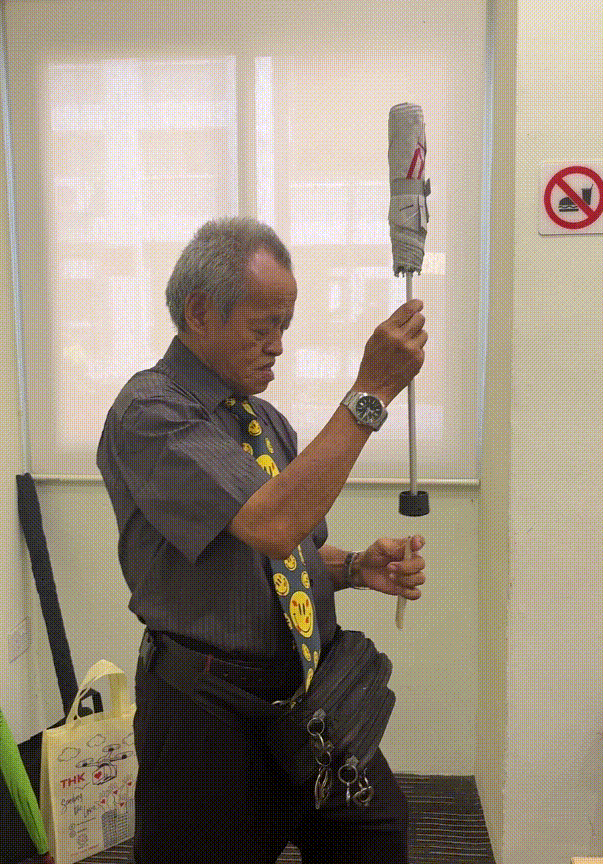 Video by Alfie Kwa.
Video by Alfie Kwa.
He could even change the direction of a spinning umbrella while balancing it on his pen:
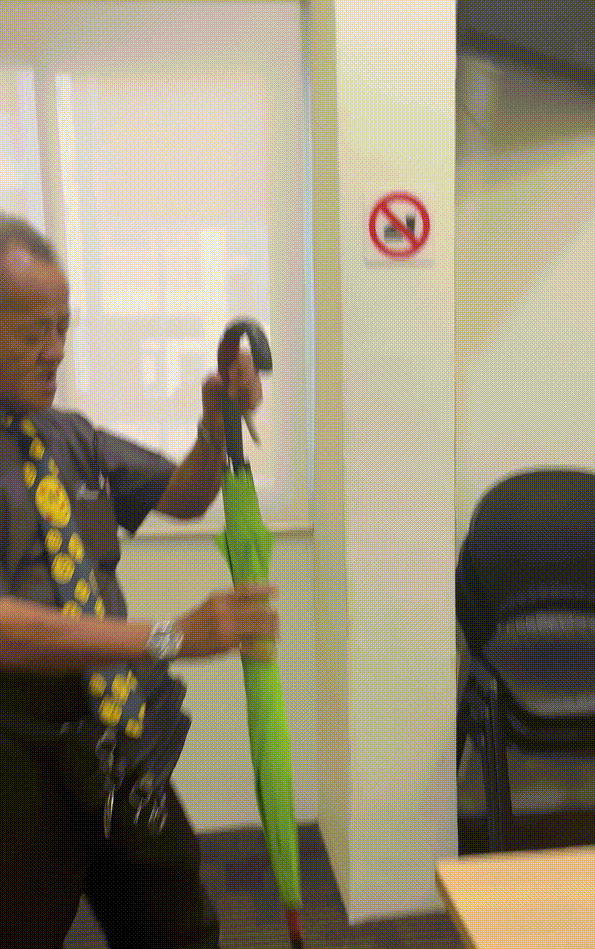 Watch to the end to see his umbrella change direction. Video by Alfie Kwa.
Watch to the end to see his umbrella change direction. Video by Alfie Kwa.
I found myself mesmerised as Lai wielded his props and tricks. Alongside his dexterous hands, he had a sharp tongue and magnetic charisma too.
Lai continued by showing us some magic.
Taking a ring and chain out from his tote bag, he held them up, showing that they were separate from each other.
Then, he swiftly dropped the ring onto the chain, and the two objects connected, as if they had been threaded together this whole time.
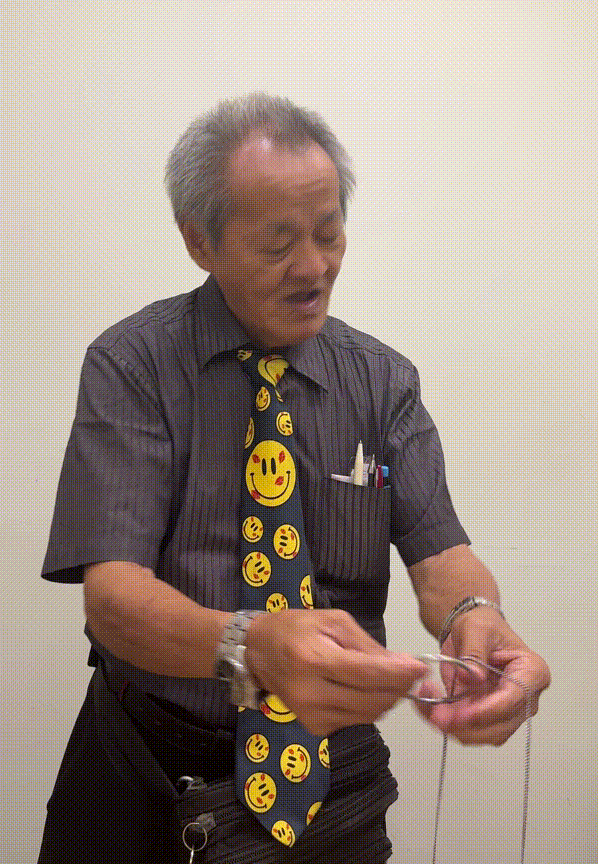 Video by Alfie Kwa.
Video by Alfie Kwa.
Lai says he taught himself to spin items, while he learned the magic tricks from passersby who interacted with him as he went about the neighbourhood.
When asked how long it took him to learn all of this, Lai replied cryptically: "Not that long."
Given this aptitude for picking up skills, I was surprised to hear that he wasn't planning to add to his repertoire — at least for the foreseeable future:
"No, I won't be learning any new tricks. Because I don't want to carry more props."
Regardless, I couldn't help but admire his boundless reserve of self-confidence.
He has a remarkable talent, and he's not afraid to show it to the world.
And if you're watching his performances, you'd better believe it.
The man behind the magic
Lai's performances were simply larger than life. He is just as colourful and buoyant as he was 15 years ago.
Still, I wanted to get a glimpse into the man behind the magic, beyond the showman side of him that he presented.
Thankfully, I was able to speak to someone who has been working with Lai for the past 17 years.
Roger Neo is the centre manager at Tung Ling Community Services, an agency that engages senior citizens living in the Dakota Crescent area.
In that time, Neo said, Lai had virtually attained celebrity status in Dakota.
Lai spontaneously performs his animal noises and magic tricks around the neighbourhood, and sometimes travels further to perform at community events in Ang Mo Kio, Toa Payoh, and Jurong.
But Neo also shed some light on Lai's life away from the spotlight.
To my surprise, Neo's first interactions with Lai were not positive ones.
"My impression, on my first encounter with him, was that he was self-centered," Neo said, recalling how Lai seemed mostly motivated by money or other benefits to himself.
But Neo has seen Lai change over time.
"We see that his character is getting from good to better: more tolerant of the people around him, less impatient, and willing to help us in the centre," said Neo.
Lai is also more helpful and open-minded, Neo added.
"[In the past], he would never lift a finger to help with any logistics set up, like spreading out the chairs for elderly activities," said Neo.
Now, Lai can sometimes be found helping to clear chairs and tables without even being asked for help.
 Lai now helps the elderly activity centre with the setting up and clearing of tables and chairs for their activities. Photo courtesy of Roger Neo.
Lai now helps the elderly activity centre with the setting up and clearing of tables and chairs for their activities. Photo courtesy of Roger Neo.
"I believe his character changed because he mixes with our centre's staff and volunteers," Neo said. "He sees that they are loving, caring, and always helping to look after the interests and needs of others before themselves."
I found that sentiment oddly inspiring.
On the surface, it might seem that Lai is the same colourful, smiley old man as he was 15 years ago.
But behind that public persona, there is a person who has changed and grown through his interactions with those around him.
Neo continued:
"In the past, he would always repeat himself with the same old story. When you tell him you've heard it many times before, he would get angry.
Now, he just smiles."
As I observed the charismatic old man in front of me, I wondered how else his internal world had changed over the decades.
And I wondered about the humility and self-awareness that must be hiding underneath Lai's energy and theatrics.
The quest for a licence
Lai may be a neighbourhood celebrity at the ripe old age of 70, but he's keen for his work to reach a wider audience.
His next goal is to attain an official busking licence, which would enable him to showcase his talents at more public venues.
The volunteers at Tung Ling Community Services, including Neo, are assisting Lai in his efforts to attain the licence.
Lai's audition for the licence with the National Arts Council took place on Jul. 5.
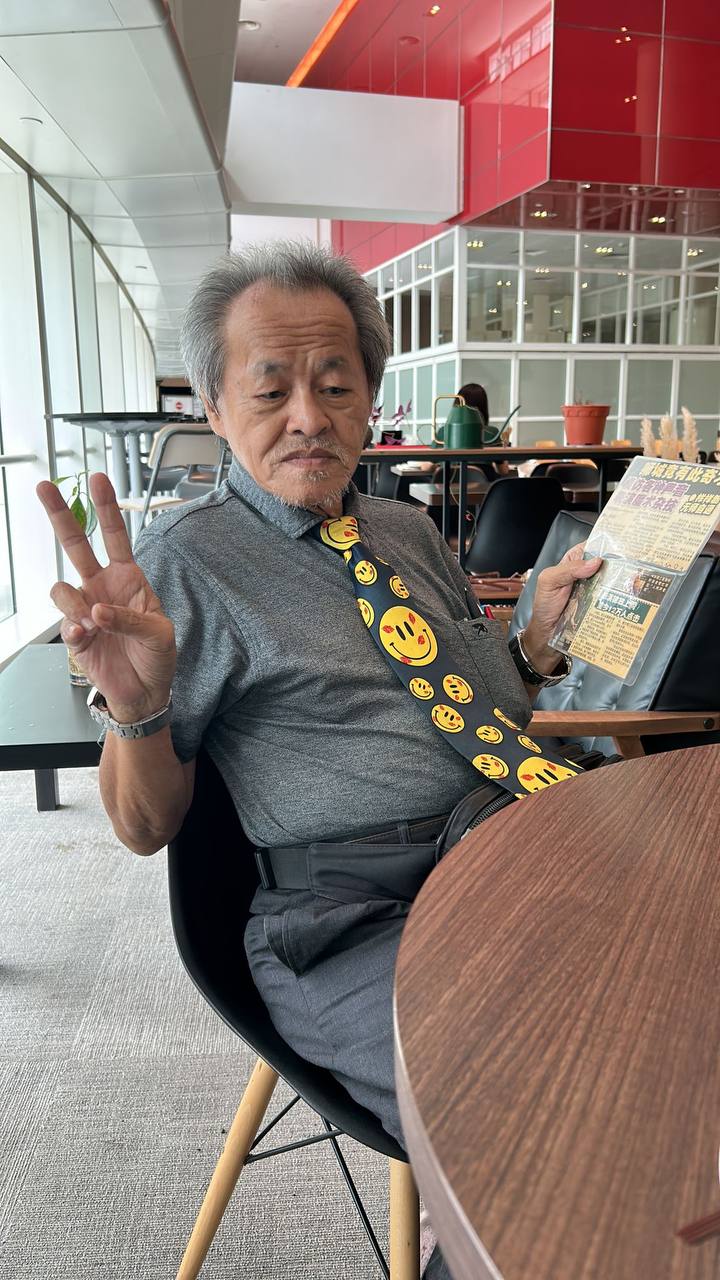 Lai poses for a photo while waiting for his audition slot with the National Arts Council. Photo courtesy of Stacy Ong.
Lai poses for a photo while waiting for his audition slot with the National Arts Council. Photo courtesy of Stacy Ong.
Funnily enough, Lai's choice of outfit for his audition was the exact same one he'd donned for our interview with him.
Maybe it was intentional to pick this same outfit for events: the grey shirt for a sense of formality, and the eccentric tie for a splash of personality.
He also made it a point to bring everything he might need to present to the audition judges—including the same laminated newspaper clippings telling his story.
The results will be released a week from the audition date. But Lai is feeling "confident" about the audition, Neo told me.
I wouldn't have expected anything less.
A familiar lunch spot
At the end of our interview, I thanked Lai for his time, and invited him to lunch.
Of course, he insisted on showing us one last trick before we left, spinning a shiny metal rod on his ballpoint pen tip.
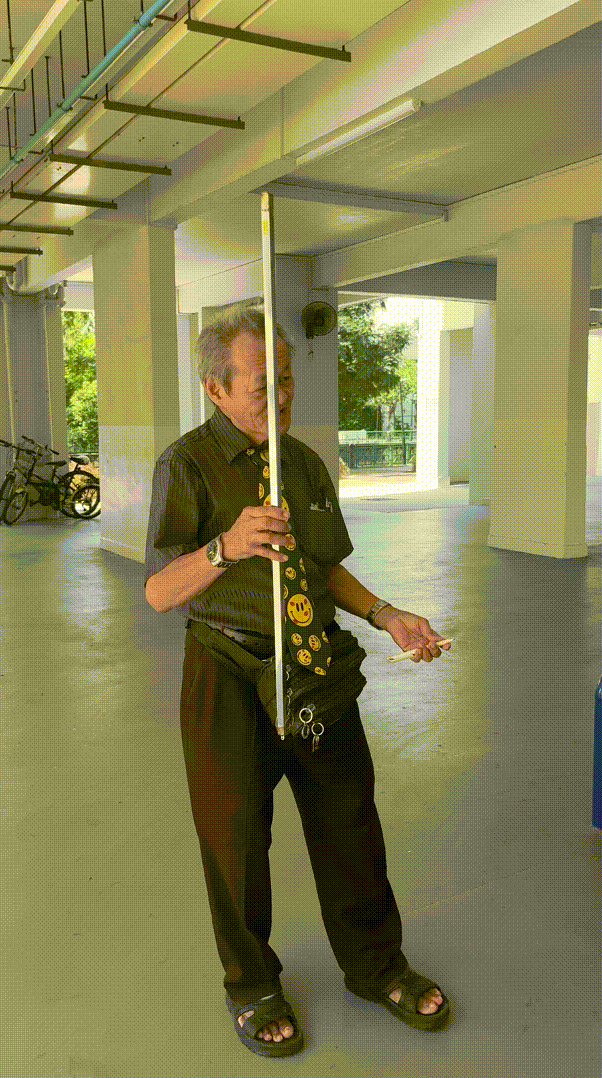 Video by Alfie Kwa.
Video by Alfie Kwa.
He likes to perform this trick at night, he said, because the shiny effect of the spinning rod would be more pronounced at night.
But it's not like he was going to let the time of day stop him from performing, was he?
Before we left, Lai had to clarify one last time:
"This will be on the newspaper, right?"
Neo, who was there to send us off as we left the elderly activity centre, responded with a laugh.
"I will print out the article for him," Neo said. "He'll want to frame it up!"
We headed over to Lai's usual stomping ground: the nearby Old Airport Road Food Centre. Lai told us that it was closed for cleaning that week, but he insisted on bringing us there anyway, saying that we could go elsewhere for our meal afterwards.
As it turned out, he simply wanted to show us the place where he was once interviewed by now-inactive online magazine poskod.sg.
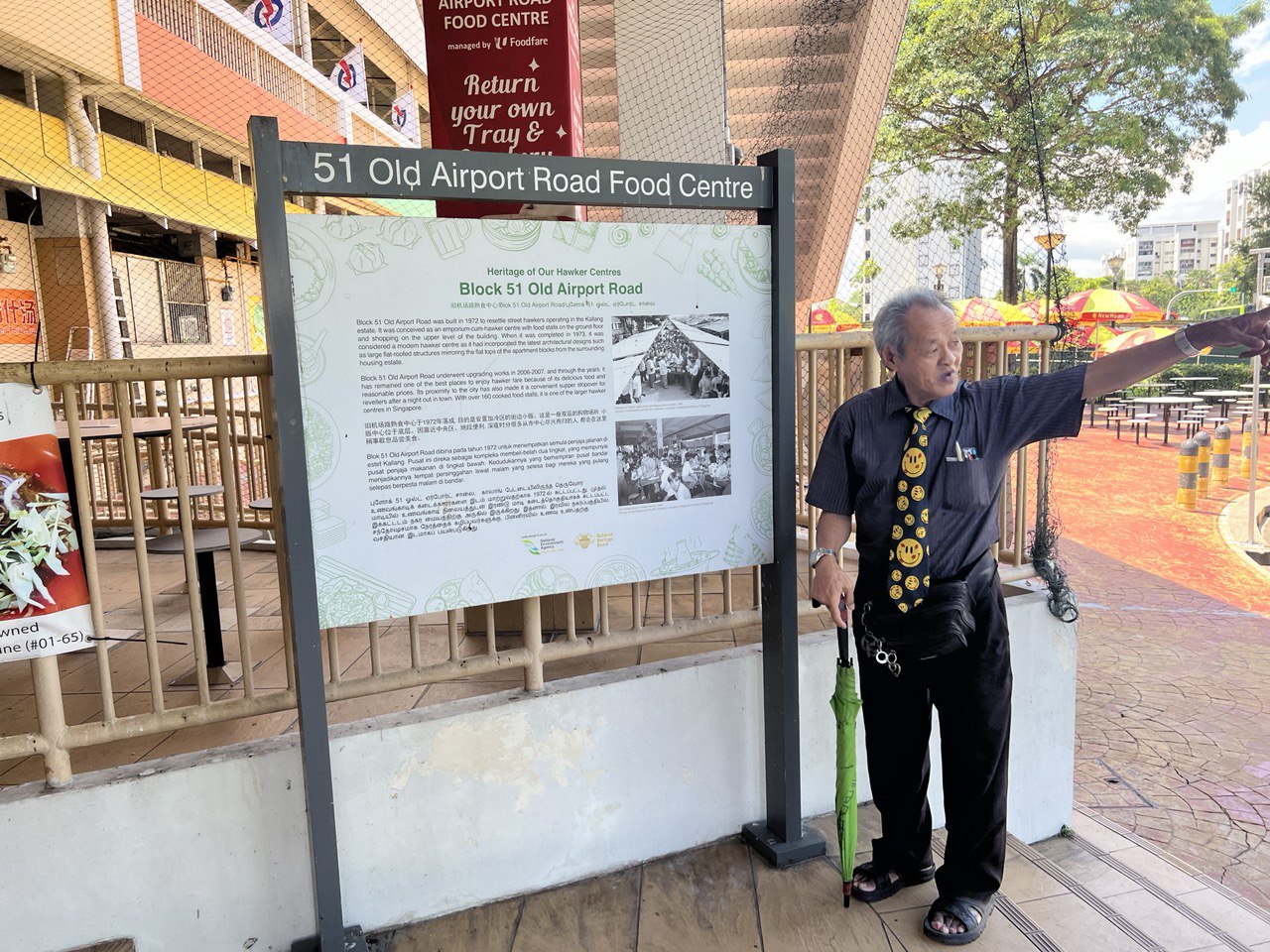 Lai points towards a set of tables where he was once filmed for an interview. Photo by Ilyda Chua.
Lai points towards a set of tables where he was once filmed for an interview. Photo by Ilyda Chua.
I looked over at the tables, still slightly wet and empty from the cleaning efforts.
Maybe one day, you'll see Lai sitting there, too.
And maybe this time, he will be sitting alongside a busking licence and a bag of coins, spinning umbrellas and crowing like a rooster.
Have something even more interesting going on in your neighbourhood? One-up us at [email protected].
Firsthand is a new content pillar by Mothership, featuring in-depth stories about people and their issues.

Top photos by Ilyda Chua.
If you like what you read, follow us on Facebook, Instagram, Twitter and Telegram to get the latest updates.

